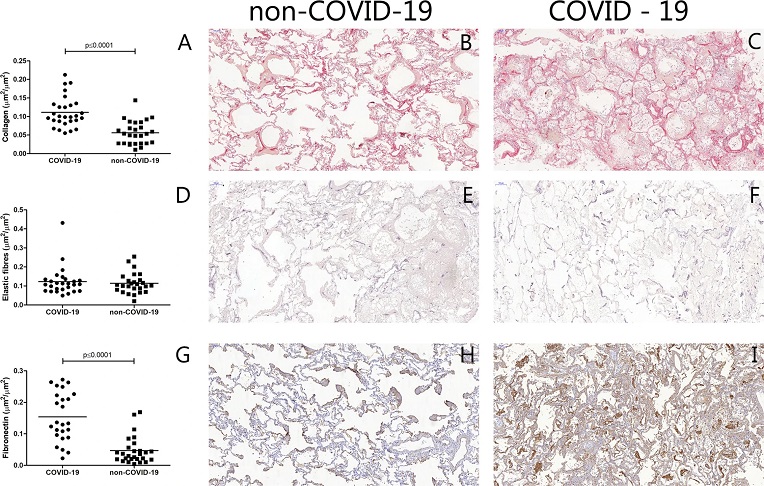COVID-19 News: Brazilian Study Shows That SARS-CoV-2 Infections Induce More Pronounced Lung Extracellular Matrix Deposition Than Other Causes Of ARDS!
Nikhil Prasad Fact checked by:Thailand Medical News Nov 26, 2023 2 years, 1 month, 3 days, 4 hours, 16 minutes ago
COVID-19 News: The ongoing battle against the COVID-19 pandemic has led researchers worldwide to delve into the intricate details of the SARS-CoV-2 virus and its impact on human health. A recent study that is covered in this
COVID-19 News report, conducted by the Faculdade de Medicina da Universidade de São Paulo in Brazil has shed light on a critical aspect of severe COVID-19 cases - the pronounced lung extracellular matrix (ECM) deposition. The findings not only highlight the distinctive features of COVID-19-related acute respiratory distress syndrome (ARDS) but also contribute essential insights into the potential long-term effects on survivors.
 Graphical representation of the lung tissue extracellular matrix composition: Comparison between the COVID-19 and non-COVID-19 cases. A: Collagen (µm²/ µm²). Photomicrographs of non-COVID-19 (B) and COVID-19 (C) stained with Sirius red. D: Elastic Fibres (µm²/ µm²). Photomicrographs of non-COVID-19 (E) and COVID-19 (F) stained with Weigert’s resorcin-fuchsin with oxidation. G: Fibronectin (µm²/ µm²). Photomicrographs of non-COVID-19 (H) and COVID-19 (I) immunostainned with anti-fibronectin antibody. Bars show the mean and each point represents one patient. Scale bar = 100 μm
Understanding the Significance of Lung Fibrosis in Severe COVID-19
Graphical representation of the lung tissue extracellular matrix composition: Comparison between the COVID-19 and non-COVID-19 cases. A: Collagen (µm²/ µm²). Photomicrographs of non-COVID-19 (B) and COVID-19 (C) stained with Sirius red. D: Elastic Fibres (µm²/ µm²). Photomicrographs of non-COVID-19 (E) and COVID-19 (F) stained with Weigert’s resorcin-fuchsin with oxidation. G: Fibronectin (µm²/ µm²). Photomicrographs of non-COVID-19 (H) and COVID-19 (I) immunostainned with anti-fibronectin antibody. Bars show the mean and each point represents one patient. Scale bar = 100 μm
Understanding the Significance of Lung Fibrosis in Severe COVID-19
The primary cause of mortality in severe COVID-19 cases is respiratory failure, attributed to diffuse alveolar damage (DAD), a hallmark of ARDS. Concerns about lung fibrosis in post-COVID-19 syndrome have emerged, with variable prevalence rates. Despite the relatively low risk, the sheer number of infections suggests a significant potential for patients developing lung fibrosis. This study aims to bridge the gap in our knowledge by investigating the composition of lung ECM in severe COVID-19 cases and comparing it with other causes of ARDS.
Exploring the Extracellular Matrix Composition in Severe COVID-19
The extracellular matrix plays a pivotal role in cellular processes, including scaffold support, cell adhesion, migration, and survival. In the lungs, the ECM's composition is crucial for homeostasis, injury response, and mechanical properties. Major ECM components include collagen, elastic fibers, fibronectin, and proteoglycans. The study analyzed lung tissue from 28 fatal COVID-19 cases and compared it with 27 cases of non-COVID-19 ARDS, considering mechanical ventilation (MV) duration. The results revealed a significant increase in collagen, fibronectin, versican, and transforming growth factor-beta (TGF-β) in COVID-19 cases, emphasizing the unique pulmonary environment induced by the virus.
Insights into ECM Dynamics and TGF-β Expression
The study observed an early and excessive expression of TGF-β in fatal COVID-19 cases after the onset of mechanical ventilation. TGF-β, a profibrotic cytokine, has been implicated in regulating immune resp
onses, antibody production, and tissue remodeling. The uncontrolled ECM assembly in COVID-19 cases resulted in prominent collagen deposition compared to other ARDS causes. Additionally, there was a transition of upregulated genes related to fibrillogenesis to collagen production and ECM disassembly during the course of mechanical ventilation. Notably, lung collagen levels were higher in female COVID-19 patients.
Implications for Understanding Pulmonary Abnormalities in COVID-19 Survivors
The study's findings provide valuable pathological substrates for comprehending the high prevalence of pulmonary abnormalities in COVID-19 survivors. The identified patterns of ECM composition and remodeling, along with the role of TGF-β, contribute to our understanding of the distinct pathophysiology associated with severe COVID-19. The study acknowledges the potential long-term impact on survivors and emphasizes the need for continued research to unravel the complexities of COVID-19-related lung fibrosis.
Clinical Correlations and Influence Factors
The study explored various clinical correlations, including age, sex, body mass index (BMI), and the ratio of arterial oxygen partial pressure to fractional inspired oxygen (PaO2/FiO2). It revealed that all assessed ECM components, except elastic fibers, were influenced by COVID-19. Collagen density was significantly higher in females, emphasizing a potential gender-specific aspect in COVID-19-related lung fibrosis. The duration of mechanical ventilation also played a role, with the TGF-β density being higher in COVID-19 cases with shorter ventilation periods.
Transcriptomics and Cytokine Profile Analysis
To gain deeper insights, the study conducted transcriptomic analysis on severe COVID-19 cases, comparing those with up to six days of mechanical ventilation to those with seven days or more. The results unveiled increased expression of genes related to collagen assembly and organization in the early stages of ventilation, transitioning to fibrillogenesis and ECM degradation with prolonged ventilation. Noteworthy was the identification of specific genes associated with immune responses, phagocytosis, and mitosis, providing a comprehensive view of the molecular mechanisms at play in severe COVID-19 cases.
Conclusion
In conclusion, the Brazilian study significantly contributes to our understanding of severe COVID-19's impact on pulmonary pathology. The unique ECM composition observed in fatal COVID-19 cases, characterized by early TGF-β expression and uncontrolled ECM assembly, sets it apart from other causes of ARDS.
The study provides crucial pathological insights into the prevalence of pulmonary abnormalities in COVID-19 survivors, emphasizing the need for continued research to develop targeted interventions for long-term complications. As the global scientific community works tirelessly to combat the COVID-19 pandemic, studies like these pave the way for more informed strategies in patient care and post-recovery management.
The study findings were published in the peer reviewed journal: Respiratory Research.
https://respiratory-research.biomedcentral.com/articles/10.1186/s12931-023-02555-7
For the latest
COVID-19 News, keep on logging to Thailand Medical News.
